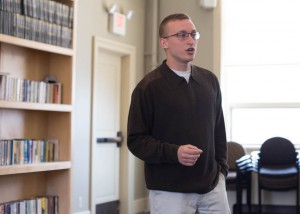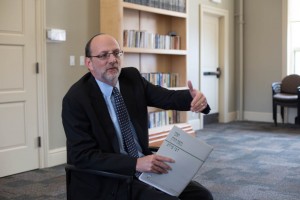[soundcloud id=’200823881′]
By Danielle Chaloux
Herb Keinon, a diplomatic correspondent from the Jerusalem Post spoke at the University of Connecticut on Monday, breaking down the latest election and offering an analysis on Israeli politics. In March, Israeli voters turned out in droves, with nearly 75% of the eligible population voting in the 2015 legislative elections. While many commentators and foreign pundits thought that the election would be over social and economic issues, such as the high cost of housing, the reelection of Benjamin Netanyahu showed that there was something else on their minds.
And what happened, was we saw that wasn’t the case, the country went to the polls, and the country did not vote on the economic issues, the country voted on security issues, and the country brought back Netanyahu,” said Keinon.
Netanyahu has been elected as the Prime Minister of Israel four times, and according to Keinon, this trend shows that the outside pressures, notably from Iran, remain of utmost importance to the people.
“A sense of insecurity animates so much of Israeli society today. In order to understand Israel today, you have to understand a sense of insecurity. The second intifada that started in 2000 fundamentally changed the Israeli psyche,” asserted Keinon.
The high profile disagreement between Netanyahu and American President Barack Obama has been of much concern, as talks with Iran over a nuclear agreement progressed in Switzerland. Keinon was quick to point out that the U.S.-Israel relationship is much deeper than the relationship between the two leaders at any given point.
“What you have is a crisis in a relationship between the President and the Prime Minister. You don’t have a crisis between the U.S. and Israel, and that’s a difference. After 50 years, the relationship between Israel and the U.S. is wide enough, its deep enough its broad enough, it has enough support across the spectrum that it will survive huge differences between the president and between the prime minister,” he said.
Israel has acted in the past without express support from American leadership, and at times has made decisions that directly opposed the United States’ best recommendations. Keinon argued that this trend demonstrates Israel’s behavior in situations when it feels cornered and backed up against a wall. Keinon explained these differences in opinion with a handy mnemonic – the four Ts.
“When we look at Iran, and you look at Iran, we’re looking at it from different four ts, what are the four ts? Trauma, threat perception, trigger and trust,” Keinon explained.

UConn sophomore and Huskies for Israel President Jacob Burte speaks at Monday’s event. Huskies for Israel was a sponsor of the event. Photo credit: Danielle Chaloux
To take an example, while both countries are against a nuclear Iran, the United States sees it as an upset in the world order, and Israel does too, but the concern is more direct,
“Our concern is if they get this power, if they become a nuclear power, how will that embolden all the proxies that we fight on a weekly, monthly, yearly basis,” Keinon said. “How will it embolden Hezbollah, how will it embolden Hamas, how will it embolden Iran to create this radical Shiite arc from Lebanon to Syria to Iraq and down into Yemen. And that threatens us.”
Israel’s position has changed dramatically in the country’s relatively short history. Keinon closed his talk with an anecdote from his time on the diplomatic beat that illustrated the evolution of Israel, and the potential for the future.
“Benny Gantz was a fascinating guy because Benny Gantz’s mother was a survivor of Bergen Belsen who when she was liberated weighed 30 kilos, this is something Netanyhu said when he went and he swore him in. And why is that fascinating? Because you see that in one generation, one generation, you went from a survivor of Bergen Belsen and her son is the head of the strongest army in the Middle East,” Keinon said. “In one generation.”


